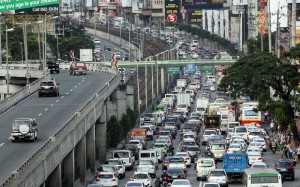Mind shift on transport seen to solve traffic woes
MANILA, Philippines—With commuters already fed up with monstrous traffic gridlocks, it is time for a mind shift and road diet.
Environmentalist lawyer Antonio Oposa Jr. on Friday called for a mind shift on transportation, which would steer people to walk and use bicycles and other more sustainable modes of transportation.
At present, Oposa noted that most people dream of owning cars, which just clog up the roads.
“It’s a 180 degree mind shift from roads that are meant for vehicles to roads that are meant for people; from bias for private transportation to bias for public transportation; from wasting space to the efficient use of space; from road widening to road diet,” Oposa told a Senate hearing on sustainable transportation and encouraging bicycle use.
He said this road diet meant narrowing part of the roads reserved for vehicles and devoting more space for sidewalks for pedestrians and bicycle lanes.
He also said it was unfair that majority of the road is devoted for vehicles, when less than one percent of the population in the Philippines owns cars.
And yet this majority have no proper place on the road.
“People who don’t have cars are not even given a proper sidewalk, proper bike lane, not even given a proper option,” he said.
He said this was unequal protection of the law and “discrimination against the poor.”
Oposa said he was not against cars, and in fact has one. But he would rather not have a car and instead have efficient public transportation, he said.
He said this road diet had been proven successful in other countries, such as Amsterdam.
He also said there were several good examples of efficient public transport in the country, though these were just in certain areas and not widely practiced.
These include a tricycle rapid transit where several of the vehicles are tied together, and only the one in the lead is running and is towing the others. There are also self-contained renewable energy transport vehicles in Cebu which are solar powered, he noted.
He said it was so easy to put in place more efficient means of public transportation.
“We don’t need money, we just need a little imagination,” he said, adding that people should not underestimate the genius of Filipinos.
Oposa also said building more roads was not the solution to traffic problems, and said this was “like trying to fight a fire by pouring gasoline instead of water.”
Sen. Pia Cayetano, who chaired the hearing, also called for a sense of creativity to look for ways to come up with sustainable and alternative modes of transportation.
Such measures are intended to increase efficiency, improve people’s health, improve air quality, and reduce congestion.
Biking is one form of transportation being promoted, but Cayetano noted that it was difficult to encourage such an activity in Metro Manila.
Though the Metro Manila Development Authority has designated bike lanes in several cities, few are using these because of safety concerns.
These lanes are also not connected to each other, making it difficult to go from one city to another. There is also a lack of facilities such as bike racks in public areas, including train stations.
Cayetano’s sustainable transportation bill seeks to install three-meter sidewalks to encourage people to walk and to ensure the safety of pedestrians. It also seeks to require cities and municipalities to designate bike lanes, and for certain buildings to have bicycle parking spaces and bike racks.
The measure also seeks to promote the water ferry system and a bus rapid transit system.















